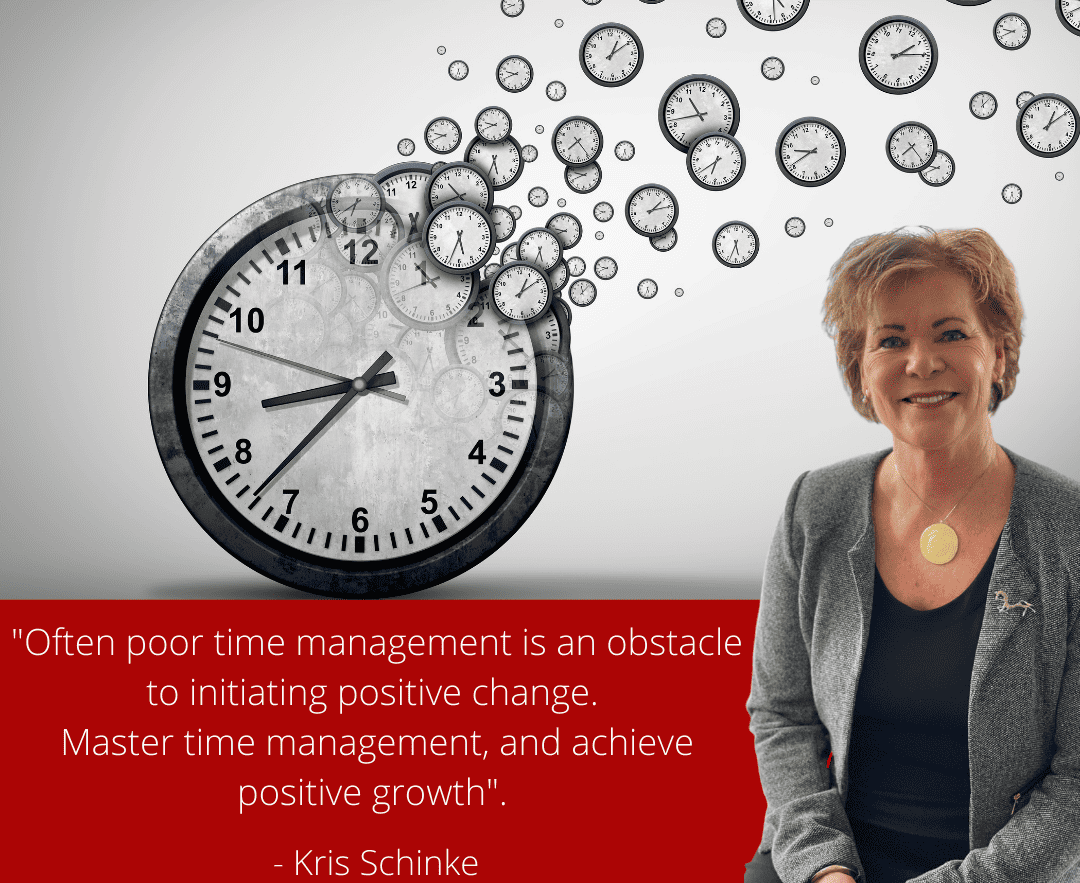Time Management seems to be one of the most popular personal improvement and professional development topics there is. We see it less about managing your time but rather doing more in less time. Planning and goal setting are also critical areas of time management and the commitment to finish what you start, when you plan to, are keys to success.
One of the biggest reasons we don’t get as much done as we set out is we are easily distracted, especially if we deem a particular priority project difficult, or challenging. If it is a necessary and an ongoing priority, it would be important to get the training required to gain proficiency. If it is something that can be delegated, consider that instead. We often have several business tasks that slow us down, so it is more efficient to delegate those weekly or monthly. The time saved doing this allows one to pursue other priorities.
Today, we appear pleased to consider ourselves always busy. It is a badge of accomplishment, and often we do not stop to audit our activities to ascertain why we are always so busy. Consider taking the word busy out of your vocabulary and replace it with perhaps being productive.
What is the (or your) definition of being productive?
Typically, we consider ourselves productive when we have gotten either everything we wanted to get done, or we have had a fruitful day. We feel the days or weeks results are good, and positive. We have worked with purpose and accomplished our goals. We have planned, we have prioritized, we have focused, and we have completed. And we have been very busy!
What is the (or your) definition of Time Management?
Typically, we feel we have worked smart, not hard, to get more done in less time. We have planned well, avoided distractions, and stayed focused. We may also have not over planned, or over promised, knowing how to say no when necessary to additional requests for contributions or commitments.
Are there goals for Time Management and Productivity in your organization?
In many organizations, the growth is no longer in proportion with the expectations. In fairness, organizations can prepare for consistent growth and proportionately plan the appropriate hiring, onboarding, and training to avoid any loss of momentum.
Employees at all levels are connected via personal devices, and the temptation to respond to email or work on projects after hours is high. The employees who work additional hours, as a result, may be considered as employees with superior time management skills, yet they may just be working extra hours. The question is, how can an organization measure this, and how can employees who assumes this is the expectation get a break. Meeting demanding deadlines considering busy schedules requires Time Management training.
Read more about our Enhanced Productivity and Time Management Training.
Consider the 4 biggest time wasters: whether personal or professional
- Social media scrolling and while we all use social media for different purposes, addressing the social media for business is priority and the rest is for pleasure. The pleasure component can occur on the lunch break and be limited to 20 or 30 minutes per day.
- Spending too much time on email; plan the time blocks you will address email and have a “touch it once” policy so your inbox is relatively lean. Turn off notifications that may cause you to check your email with each message; that is a big-time waster and distraction.
- Not pre-planning daily needs such as meals (prepare multiple dinners at one time and always pre-plan breakfast and lunch), lack of grocery shopping routine (including a list), last minute errands.
- Doing it all yourself, thinking that others cannot meet your expectations or standards. If you complain about being too busy, what can you delegate, and provide exposure and training to someone at the same time?
Being so busy that you always run late labels you as unreliable. You are likely not, but the fact that you arrive late for everything, whether business, family or social events means you do not have a reliability reputation. (Sometimes one blames this on culture “our people are always late”); that is simply an excuse. Do not let culture, or pigeonholing, create that excuse that lateness becomes a habit.
Visit this post next to read about keeping your team engaged as you reduce those distractions!
Does environment play a role?
Believe it or not, a messy environment can create the disarray and disorganization that contributes to getting less done. One can’t find something, one can’t stay focused, or one tries to work on multiple projects at once. From a logistical perspective, one can lose time every time one searches for a lost paper or file on a cluttered desk. On the opposite spectrum, the same holds true for one who has gone paperless. A study by Harvard Business Review revealed that one can lose up to two hours a week fruitlessly looking for lost digital documents. The study also stated individuals that feel overwhelmed with the amount of “stuff” on their desks are more likely to procrastinate. That presents yet another time waster. Organize a “spring cleaning” event every month, or more, if you constantly find your desk in a mess.
“Clutter is not just the stuff on your floor – it’s anything that stands between you and the life you want to be living.” – Peter Walsh
Time Management Habits
Micro-managing can also challenge one’s time management. Micro-managers spend unnecessary time following up with subordinates, double and triple checking others work project details, and doing more themselves than they should. All that takes time. Besides wanting to control every detail, anyone prone to micro-managing should consider working with a coach to learn to let more go and give others the autonomy they deserve. The benefits are many, including improved employee morale, confidence and for the micro-manager leader, more time and peace of mind.
Some people are self-proclaimed workaholics but working many hours does not mean one manages one’s time well. A workaholic is one who works compulsively, often missing important family occasions and not sleeping enough. This is not someone who has a strategically planned day or week, with a start and an end time. This is a good example of someone who does not plan or delegate well, and eventually being compelled to work all the time becomes a bad habit. A workaholic could also be a micromanager, or one who lacks confidence in others and wants to do everything themselves.
Delegation is not just a work skill; it’s a transformative leadership tool that can propel individuals and organizations towards excellence.
The Three Golden Rules to Delegation (Making Business Matter, UK) are:
- Assign responsibility to a competent participant or team member who is responsible for the outcome
- Provide authority to this team member so they have the autonomy to accomplish the expected task
- Expect competence but offer support when required
Some Popular Time Management Approaches
The traditional approach to time management includes four phases: planning, setting priorities, scheduling, and implementing the plan.
- Planning: Identify all tasks to be completed and their deadlines
- Setting: priorities Identify the best sequence of events
- Scheduling: Identify when each task will begin and when each task is likely to be completed
- Implementing: Execute the plan
The Priority Matrix is a way to quickly determine the priority of a task. When completing the matrix, the user determines the level of importance and the level of urgency each task has.
The Pickle Jar Theory imagines one has a pickle jar, and it is full of sand, pebbles, and rocks. The rocks are at the top, the pebbles are spread throughout, while the sand is at the bottom. The goal is to decide what is:
- Sand (least important)
- Pebble (medium importance)
- Rocks (priority)
When Deep Work author, Cal Newport wrote this book he suggested a time management approach in which you separate deep work from shallow work (which could include fewer demanding activities like staff meetings and responding to emails).
Visit this post next to read about Executive Coaching and how it can be effective for time management!
“If You Fail to Plan, You Are Planning to Fail.”. – Benjamin Franklin
According to Harvard Business School, four out of five adults report feeling they have too much to do and not enough time to do it. Time-poor people experience less joy, less family time and can become easily overwhelmed. Begin to think of your time as an activity, and not just “being busy”. Time is an asset and if used wisely, there should usually be enough.
It is no secret why the adage “If you want something done, ask a busy person” exists. A busy person has mastered their calendar, organized their priorities and knows how to juggle interruptions and unplanned distractions. As Gloria Vanderkam, author of I Know How She Does It, says, “A good juggler can juggle more”.
As with any new habit, or newly committed habit, one can benefit from an accountability partner who is willing to hold you accountable. A certified leadership coach is the best such partner, one who can offer candid observations, challenge excuses, follow up on the action plan, offer accolades, and help celebrate achievements.
X5 Management’s newly updated Enhanced Productivity and Time Management Training will help you uncover your unique workplace personality and unpack what productivity and time management techniques could benefit you. This training will give you the tools you need to become more successful in the workplace.




